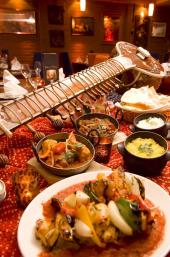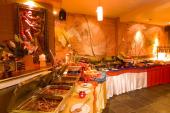Food at Kama Sutra
 A Festival of Flavours
A Festival of Flavours
One of the most exciting facets of Kama Sutra's dining offer is its whole-hearted celebration of the entire sub-continent's incredibly varied and fascinating cuisine - a policy which has taken on a major new impetus with the employment of special regional chefs adept in the classic dishes of their homelands.
This is reinforced by special themed "festival" events, which bring several cultural elements colourfully together - and in particular native costume and regional cuisine. These brilliant events involve everyone concerned in a great deal of effort, says Sandy Mahju, but also give staff the chance to revel in their own regional culture.
Recognising and celebrating the difference between Gujerati and Hyderabadi culture (for example) on a regular basis cements Kama Sutra's position as a place which takes inspiration from every part of the sub-continent, and particularly from its own hard-working and committed staff.
So expect succulent fish dishes influenced by the traditions of former Portuguese colony Goa; or exotic delights from areas as far apart as Kashmir and the Tamil south or Rajahstan.
A classic biryani dish is a masterly cooked-from-scratch creation with an incendiary sauce which neverless carries fabulously subtle underlying flavours - like the musky tang of "hing", or asafoetida, which gives the whole dish a memorable edge: the consistency of rice and rich, tender lamb is exquisite, both married perfectly together in a brilliant fusion which represents this great Indian rice dish at its best.
But of course that's just one entree among many, and while Kama Sutra does not offer a vast encyclopaedia of dishes there are certainly too many choices jostling for the first-time diner's attention: even if you're not a vegetarian, for example, the unusually broad and imaginative choice of veggie options makes this section well worth a look in its own right.
Shuruaat
This translates as starters, and the broad selection begins with a pakora selection which - just to prove we're in Scotland - includes a haggis variety. But if you don't fancy this odd fusion confection you could look at options such as, for example, tandoori salmon; or Batakh Achari, which is duck marinaded in pickle and grilled in a charcoal oven, and served with a spicy mango sauce.
Or you could go for the Khajuraho Sensual Selection (every selection is sensual here - it's the Kama Sutra, after all), which is a medley of several of the most popular starters from the menu, available either as veggie or non-veggie options.
The temptation with this section, particularly if you don't have a huge appetite, is to stay there - two or more starters make a very appealing "tapas" approach to Kama Sutra's cuisine, while allowing you to choose options such as Tandoori Aloo charcoal-baked potatoes stuffed with Punjabi spices - that you might not select if you aimed to follow through with a substantial main course.
 Taste of India
Taste of India
Indian restaurant enthusiasts will recognise some familiar names among the more exotic choices - for example Chicken Korma or Traditional Bhoona - and this is a section largely intended to ensure that anyone who still revels in the earthy delights of a Chicken Tikka Masala gets the very best version of the dish the kitchen can manage.
It has to be stressed there's nothing ordinary or routine about a dish like Murgh Jalfrezi, for example - spicy chicken juliennes infused with chillies and peppers; Lamb Jalandhri, with its sauce infused with ginger, garlic, peppers and coconut cream.
Regional Classics
This is where Sandy Mahju reckons Kama Sutra has its critical edge over many other restaurants. Regional dishes are nothing "new", in Glasgow, but the regional or "desi" style here is seen as a full-on experience, one which engages fully with the culture behind each dish: the head chef, R.P. Yadav, hails from the famous ancient city of Agra, best known for landmarks such as the Red Fort; and his staff - all specialists in their own native cuisines - similarly represent the tastes and traditions of cookery in areas as diverse as Hyderabad and Goa.
Options include classic south Indian Garlic Chilli Chicken, the wonderful spinach and mustard leaf dish Saag Gosht from the Punjab; or you could splash out on the extravagant Naili Gosht, in the style you would find it cooked in Lucknow. This one, a real banquet of a dish, is lamb on the bone infused with jeera (cumin) and saffron.
Or how about King Prawn Chettinad, again from South India? It features king prawns in a picquant pepper sauce with chopped green chillies. The Hyderabad biryani is another potential delight - lamb simmered with rice and aromatic spices.
These and other enticing classics sit happily alongside menu options which also include Thali - a fixed price set menu which provides maximum options at an average price (ideal for couples and larger parties); and, a house speciality, a right selection of carefully-crafted Tandoori dishes - for example Shashlik, and Tandoori Jingha (marinaded and barbecued king prawns).
Then there's the worldwide fusion dishes - Kama Sutra Tawa Machi, for example, which is sea bass barbecued in lime juice and Indian herbs; or Zyakedar Hiran, which is venison simmered in a masala sauce and served with jeera rice and jeera aloo (cumin potatoes).
More or less regardless of which dishes you choose (although soupy curry dishes are most logical) you should try the restaurant's beautifully-made breads, from rotis to parathas and a sweet Peshawari Nan - nor is there any rule against combining (for example) this north-Indian bread with a south-Indian dish: combining regional styles in one dining experience can be very rewarding.
Vegetarian
These dishes, we're told, are inspired by the lush market gardens you find in many areas of India, with a selection which includes a classic Daal Tarka Marke, a substantial lentil-based dish tempered with whole cumin seeds with the underlying musky flavour of asafoetida ("hing"): a kitchen tradition which can transform mere lentils, however well sourced, into a real culinary delight, has to be worth its weight in gold - and at Kama Sutra it's the vegetarian options which sometimes take diners by surprise with their sophisticated textures and flavours.
Try Kurkuri Bhindi, fresh ladyfingers in a medium sauce with onions; or Pind de Choley, chickpeas (Channa daal) simmered in tamarind sauce and Punjabi spices.
Buffets
Finally it's worth noting that while Kama Sutra offers a la carte dining all day it is also deeply and rightly proud of its sumptuous buffets - Grand Evening Buffet (6pm - 9pm), Sunday brunch (12 - 4pm)m pre-theatre (until 6.30pm) and Lunch (noon to 3pm). In some ways the restaurant is at its most alluring on the stroke of noon as the manager and staff put the final touches to the imposing array of tantalising tureens: the aroma, combined with the visual spectacle of the soon-to-be-busy restaurant, in all its pristine glory, is a feast for the senses right enough.
Buffet options are also available for functions in the downstairs suite, of course, which can accommodate around 100 guests - with no charge for the hire of the suite.
Kama Sutra, 331 Sauchiehall Street, Glasgow







